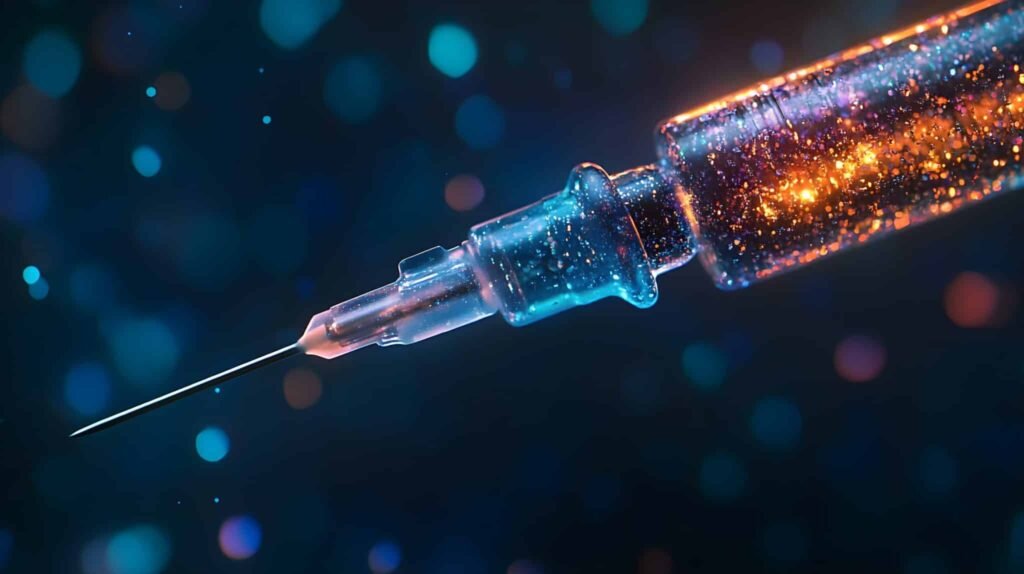The Rise of Peptide Injections: Are They Worth the Risk?
(© Delya – stock.adobe.com)
In A Nutshell
Peptide injections are rapidly gaining traction among middle-aged men seeking to counteract the effects of aging. Promising quick recovery, muscle growth, and fat loss, these compounds are increasingly popular—despite many being untested and unapproved for human use. Experts sound alarms about potential health risks ranging from severe allergic reactions to more serious complications like heart failure and tissue damage.
The Allure of Injectable Peptides
For many middle-aged men, the fear of aging is being replaced by a daring exploration into the realm of injectable peptides. These experimental compounds offer a seemingly simple solution to combat sagging skin, sore joints, and a sluggish metabolism through easy injections ranging from daily to weekly.
Once the secret of elite laboratories and niche bodybuilding forums, peptides are now flooding wellness communities and social media platforms, marketed enticingly as "next-generation biohacks." However, here’s the catch:
- Unregulated Market: Many of these peptides lack the necessary approvals for human use and extensive clinical trials.
- Growing Influence: Despite this, the hype—driven by influencer testimonials and a quest for youthful vitality—continues to escalate.
Peptides: The Science Behind the Trend
The concept of peptides isn’t entirely new in the medical realm. The first peptide drug, insulin, was discovered back in 1921, with over 100 peptide medications currently approved. However, the newer compounds trending in the fitness community differ significantly, as they remain untested in human trials.
Popular Peptides
-
BPC-157: Initially discovered in human gastric juice, early animal studies suggest it may aid in tissue repair, though no serious side effects have been noted in trials on animals like mice and dogs.
-
TB500: A synthetic version of thymosin beta-4, this peptide plays a vital role in repairing damaged cells and protecting them from further harm.
- IGF-1 LR3: A modified version of IGF-1 linked to muscle growth, animal studies indicate it can increase muscle mass significantly, although it has never been properly studied in humans.
Despite early optimistic findings, existing human research remains limited and inconclusive. For instance, a study reported that over 90% of patients felt knee pain relief after BPC-157 injections, but methodological flaws raise concerns over the validity of these claims.
The Hidden Dangers of Peptide Use
While the prospect of quick recovery and enhanced performance is tempting, the reality is that these compounds come with significant risks:
-
Allergic Reactions: The chemicals used in peptide synthesis can trigger severe allergic responses, including anaphylaxis.
-
Heart Risks: Prolonged use of performance-enhancing substances can lead to rapid heart failure, with alarming case studies documenting this in young athletes.
-
Injection-Related Injuries: Complications like compartment syndrome may arise, leading to permanent damage.
- Infectious Disease Risk: Users have reported contracting serious infections through contaminated needles, raising further health concerns.
Moreover, some peptides interfere with natural processes in the body, potentially activating pathways associated with cancer. For instance, the VEGF pathway, known to promote blood vessel growth, is active in many types of cancers. While no direct links have been confirmed between peptides like BPC-157 and cancer, the absence of rigorous human trials means long-term impacts remain largely unknown.
(For more on the health implications of peptides, visit the World Health Organization.)
A Growing Concern
The use of these unregulated substances seems to be accelerating. A 2014 study indicated that around 8.2% of gym-goers utilized performance-enhancing drugs; projections for 2024 estimate that this figure could climb to 29%. Alarmingly, only 38% of these users acknowledge potential health risks.
-
Health Gamble: Engaging in the use of these experimental compounds may yield short-term benefits, but the concealed dangers make it a risky gamble.
- Experimental Nature: Until more comprehensive human trials are conducted, users are essentially unwitting subjects in an uncontrolled experiment on their bodies.
If you’re considering peptides for improved athletic performance or recovery, weigh the potential risks against the advertised benefits. The desire for quicker healing and improved fitness is understandable, but the consequences may exceed the rewards.
Conclusion
As the popularity of peptide injections continues to surge, so do the warnings from health experts. Without adequate testing and regulatory oversight, the safety and efficacy of these treatments remain in question. For those navigating the allure of peptides, it’s crucial to conduct thorough research, consult professionals, and consider the risks involved.
(For further reading on the potential dangers of anabolic substances, check out CDC’s guide on performance-enhancing drugs.)


